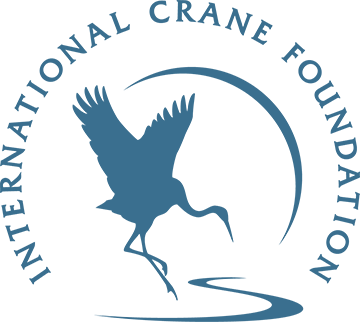What can you do to make a difference? Get informed and support ICF’s global conservation programs! From discussions on coastal water resources in Texas and crane hunting in the eastern United States, to creating awareness of illegal African crane trade or water quality in southeastern China, ICF is making its voice heard across the world. Following are four global snapshots of ICF in Action.
T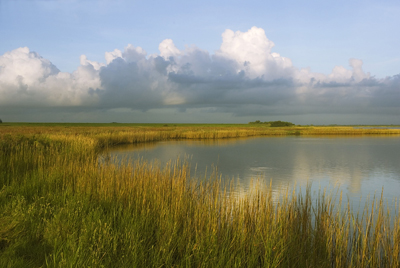 exas Coastal Wetlands
exas Coastal Wetlands
Since 2010, ICF has been a member of The Aransas Project (TAP), a consortium of non-profit organizations and Texas communities that is fighting for the freshwater inflow needs of Texas coastal wetlands and the Whooping Cranes that winter there (left, photo by Dave & Liz Smith). TAP filed a lawsuit against the Texas Commission of Environmental Quality (TCEQ), contending that TCEQ’s actions in the Guadalupe River basin have harmed Whooping Cranes, an endangered species. In March 2013, the US District Court ruled in favor of TAP, contending TCEQ violated the US Endangered Species Act. A stay was issued on the verdict and an appeal was heard in early August 2013 (the decision is pending).
ICF staff provided testimony during the TAP lawsuit and will be heavily involved in the development and ultimately the implementation of a Habitat Conservation Plan, which was mandated in the original court decision and will be the foundation for the wise water and land management needed by the cranes, other species, and people who share the coastal ecosystem.
Learn more about ICF’s work in the Guadalupe River basin.
 Sandhill Crane Hunting
Sandhill Crane Hunting
In early February 2012, a state-wide discussion was re-ignited after legislators introduced a bill proposing a regulated Sandhill Crane hunt in Wisconsin. The bill was not voted on during the state 2012 legislative session, but the bill may be proposed again in the future. With over two decades of research on Sandhill Cranes and 16 years of experience reintroducing the Endangered Whooping Crane to Wisconsin, ICF is an active participant in this issue through our sharing of data and expertise, as well as direct discussions with those concerned about the hunt decision. Currently, in addition to our involvement in Wisconsin, ICF is participating in discussions on a proposed Sandhill Crane hunt in Tennessee and has recently submitted comments on the proposal to the Tennessee Wildlife Resource Agency (TWRA).
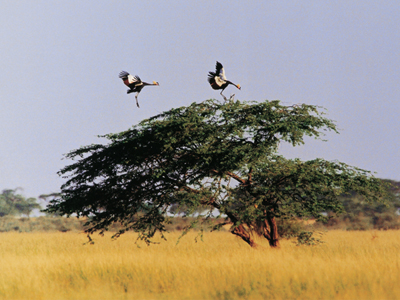 African Crane Trade
African Crane Trade
Africa’s Grey Crowned and Black Crowned Cranes (left, photo by Crane Wu) are taken from the wild for local domestication and international trade markets. This trade is one of the primary threats to crowned cranes, with a significant impact on their wild populations. The African Crane Trade Project, co-led by ICF and our South African partner The Endangered Wildlife Trust, is developing a model program to reduce the impact of captive crane trade on wild cranes. Our efforts focus on understanding the complex supply and demand chains that affect cranes; creating awareness of the status of Africa’s resident cranes and the threat that trade poses to wild populations; and advocating for changes in policies and legislation that govern the trade in cranes, both locally and internationally.
Learn more about the African Crane Trade Project.
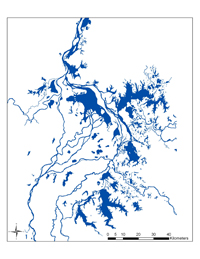
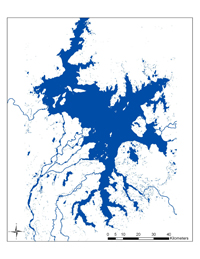 Poyang Lake, China
Poyang Lake, China
Poyang Lake is the largest lake in the Yangtze River basin and winter home to 400,000 waterbirds, more than any other location in East Asia. Poyang provides winter habitat for almost all of the world’s Critically Endangered Siberian Cranes. The lake basin is threatened by hydrologic changes caused by dams and water diversion projects, as well as declining water quality that could impact the aquatic food plants on which the cranes and other waterbirds depend.
ICF is collaborating with Poyang Lake Nature Reserve to study the linkages among cranes, aquatic plants, and water levels within the Poyang Lake basin, a long-term study that is providing vital information for evaluating future water development projects and lake management issues. Using this expertise, in 2012 ICF worked with the IUCN SSC Crane Specialist Group to prepare a comprehensive report on the management of the Poyang Lake wetlands.
Learn more about ICF’s work in the Yangtze River basin.
